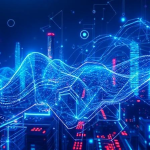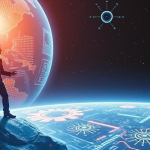As we step into 2025, technology continues to evolve at an unprecedented pace, transforming the way we live, work, and interact with the world. From artificial intelligence and quantum computing to biotech and sustainable energy solutions, groundbreaking innovations are reshaping industries and redefining possibilities. In this article, we will explore the most impactful technological advancements revolutionizing 2025 and their implications for the future.
1. Artificial Intelligence and Automation
Artificial Intelligence (AI) has made remarkable progress, with machine learning and automation becoming integral to industries ranging from healthcare and finance to retail and manufacturing. AI-powered systems now perform complex tasks, including medical diagnostics, legal analysis, and even creative endeavors like content generation and music composition.
AI in Healthcare
AI-driven diagnostic tools and robotic-assisted surgeries have improved accuracy and efficiency, reducing human error and enabling personalized treatment plans. Predictive analytics is being used to foresee potential health risks, allowing doctors to implement preventive measures before conditions worsen.
AI in Business and Customer Service
Companies are leveraging AI to enhance customer service with intelligent chatbots and virtual assistants, providing instant, personalized support. AI-driven business analytics tools help organizations make data-driven decisions, optimizing productivity and increasing profitability.
2. Quantum Computing: The Next Frontier
Quantum computing, once a theoretical concept, is now a reality in 2025. Tech giants and startups are racing to develop quantum processors capable of solving problems beyond the reach of classical computers. This breakthrough has enormous implications for cryptography, materials science, and complex simulations.
Transforming Cybersecurity
Quantum encryption is setting new standards in data security by making traditional hacking methods obsolete. Organizations and governments are adopting quantum-safe cryptographic techniques to protect sensitive information.
Advancing Drug Discovery
Pharmaceutical companies are using quantum computing to simulate molecular structures, accelerating the development of new drugs and treatments. This technology is particularly beneficial in addressing rare diseases and creating highly targeted therapies.
3. 5G and the Era of Hyperconnectivity
The widespread rollout of 5G technology has revolutionized communication, providing ultra-fast internet speeds and low latency connections. This has paved the way for advancements in remote work, virtual reality, and the Internet of Things (IoT).
Smart Cities and IoT Integration
5G has facilitated the growth of smart cities by enabling interconnected devices that optimize traffic flow, enhance public safety, and improve energy efficiency. From autonomous vehicles to smart grids, IoT-driven solutions are creating more sustainable urban environments.
Remote Work and Virtual Collaboration
With seamless 5G connectivity, remote work has become even more efficient. Virtual and augmented reality (VR/AR) technologies allow teams to collaborate in immersive digital spaces, breaking geographical barriers and increasing productivity.
4. Renewable Energy and Sustainable Tech
In response to climate change, 2025 has seen a surge in renewable energy solutions and sustainable technologies aimed at reducing carbon footprints and conserving natural resources.
Solar and Wind Power Innovations
Advancements in solar panel efficiency and wind turbine technology have made renewable energy more accessible and cost-effective. Energy storage systems have also improved, allowing for consistent power supply even in fluctuating conditions.
Green Transportation
Electric vehicles (EVs) dominate the automotive market, with autonomous electric taxis and buses reshaping urban mobility. Hydrogen fuel cells are gaining traction as a sustainable alternative for long-haul transport and industrial applications.
5. Biotechnology and Human Augmentation
Biotechnology has made significant strides in 2025, leading to groundbreaking innovations in genetic engineering, prosthetics, and bio-integrated devices.
CRISPR and Genetic Editing
CRISPR-based gene editing is being used to treat genetic disorders, enhance crop resilience, and even explore potential anti-aging therapies. Scientists are making remarkable progress in modifying DNA to eliminate hereditary diseases.
Bionic Enhancements
Advancements in prosthetics and neural interfaces have enabled individuals with disabilities to regain mobility and sensory functions. Brain-computer interfaces (BCIs) are being tested for direct communication between the human brain and digital devices, opening new possibilities for neurotechnology.
6. Space Exploration and Commercial Space Travel
2025 has brought a new era of space exploration, with private companies and government agencies working together to push the boundaries of interplanetary travel and space colonization.
Lunar and Martian Missions
Both NASA and private space organizations have launched manned missions to the Moon and Mars, focusing on establishing permanent habitats for long-term human settlement. These missions are exploring new ways to utilize extraterrestrial resources for self-sustaining colonies.
Space Tourism
Commercial space travel has become a reality, with private companies offering orbital flights for civilians. This emerging industry is expected to expand, making space more accessible to non-astronauts in the near future.
7. The Evolution of the Metaverse
The concept of the metaverse has evolved significantly, offering fully immersive virtual worlds where people can work, socialize, and engage in various activities.
Virtual Workspaces
Companies are adopting virtual offices in the metaverse, allowing employees to collaborate in digital environments that mimic physical workspaces. This shift has reduced the need for physical office spaces, lowering overhead costs and promoting global hiring.
Digital Ownership and NFTs
Blockchain-based assets, such as non-fungible tokens (NFTs), are being used to establish digital ownership rights in the metaverse. From virtual real estate to digital art, individuals and businesses are investing in unique virtual assets.
8. Robotics and Autonomous Systems
Advancements in robotics have led to the widespread adoption of autonomous systems in various industries, improving efficiency and reducing human labor in hazardous environments.
Industrial and Service Robots
Robots are now performing tasks such as warehouse management, food preparation, and elderly care. AI-powered robotic assistants are becoming common in homes, helping with daily chores and enhancing the quality of life.
Autonomous Vehicles
Self-driving cars, trucks, and drones are now commonplace, reducing traffic accidents and optimizing logistics. Autonomous delivery systems are streamlining e-commerce operations, ensuring faster and more efficient shipping solutions.
9. Ethical and Regulatory Challenges
With rapid technological advancements come ethical and regulatory challenges that require careful consideration and governance.
AI Ethics and Bias
As AI systems become more autonomous, ensuring fairness and preventing biases in decision-making algorithms is a growing concern. Governments and organizations are working on establishing ethical guidelines to regulate AI use.
Data Privacy and Security
With increased digital connectivity, data privacy remains a top priority. Stricter regulations and encryption technologies are being implemented to protect personal and corporate data from cyber threats.
Conclusion
The year 2025 is witnessing a technological revolution that is reshaping every aspect of human life. From AI-driven automation and quantum computing breakthroughs to sustainable energy and space exploration, these innovations are paving the way for a smarter, more connected, and sustainable future. While challenges remain, ongoing research, ethical considerations, and regulatory frameworks will ensure that these advancements benefit society as a whole. The future is now, and the possibilities are limitless.






Leave a Reply